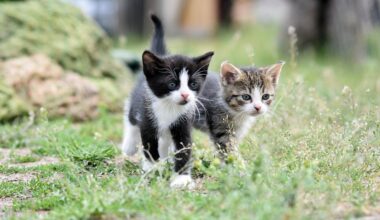Vaccination Guide Against Feline Respiratory Viruses
Feline respiratory viruses are significant health concerns for cats, causing various respiratory diseases. Vaccination plays a crucial role in feline health, preventing severe illnesses that arise from these viruses. Understanding the types of feline respiratory diseases is essential for responsible pet ownership. Viral illnesses, particularly Calicivirus and Herpesvirus, are highly contagious and can spread rapidly among cats. Vaccinating your feline companion helps create a defense against these viruses through immunization. Regular veterinary check-ups can determine the optimal vaccination schedule for your cat. Current recommendations suggest vaccinations begin at an early age, typically around six to eight weeks old. Each vaccine type has specific protocols regarding additional booster shots, varying by individual health and age. Be aware of potential side effects from vaccinations, which can occur but are generally mild. These effects often include soreness at the injection site, mild fever, or lethargy. Consult your veterinarian for any concerns regarding reactions. Staying informed about vaccination trends and guidelines is essential for ensuring your cat’s health and well-being now and in the future. Always prioritize preventive care, creating a long, healthy life for your beloved feline friend.
Understanding Feline Respiratory Viruses
Feline respiratory viruses can be debilitating, especially in younger or immunocompromised cats. Common symptoms of these infections include sneezing, coughing, nasal discharge, and ocular discharge. Quick identification and treatment are vital for improving recovery chances. Two primary virus strains contribute to these respiratory diseases: Feline Herpesvirus (FHV) and Feline Calicivirus (FCV). FHV typically results in severe upper respiratory symptoms and eye infections, while FCV may lead to oral ulcers and respiratory distress. Both viruses spread through direct contact and shared environments, including kennels, catteries, and homes with multiple cats. Vaccination against these viruses is essential as part of regular wellness visits. By ensuring your cat receives its vaccinations, you reduce their risk of developing severe illness associated with these pathogens. The importance of vaccinations cannot be overstated; they act as a proactive step toward health preservation. Besides vaccinations, maintaining a stress-free environment also aids in overall cat health and resilience against infections. Always consult your veterinarian for tailored advice regarding vaccinations and preventive measures, ensuring your cat remains healthy, active, and happy.
Regular veterinary visits are essential for monitoring your cat’s health, allowing for timely vaccinations. It is crucial to adhere to the recommended vaccination schedules to ensure your cat’s immune system is adequately supported. Cats that are frequently in contact with other cats, such as those in multi-cat households or boarding facilities, should receive vaccinations yearly or bi-annually. Discuss vaccination options with your veterinarian, who can provide guidance based on your cat’s lifestyle and health status. Being proactive helps prevent potential outbreaks and limits the spread of illnesses among feline populations. Furthermore, while vaccinating can protect against certain diseases, good general hygiene practices are equally essential. Regular cleaning of litter boxes, food dishes, and living areas reduces the following illness risks. Make sure to separate sick cats from healthy ones to prevent cross-contamination. Also, consider incorporating immune-supporting supplements and maintaining a well-balanced diet to strengthen your cat’s defenses against illness. By combining vaccinations with good hygiene and proper nutrition, you create a holistic approach to your cat’s health, ensuring they live a longer, healthier, and happier life.
Signs of Respiratory Virus Infections
Recognizing the signs of respiratory virus infections in your cat is critical for seeking prompt treatment. Early intervention can significantly aid in recovery, improving overall outcomes. Common symptoms include persistent coughing, sneezing fits, nasal congestion, and increased respiratory effort. Pay close attention to any changes, such as diminished appetite, lethargy, or unusual behavior, as these may indicate discomfort. Many cats may also exhibit ocular issues, including watery or swollen eyes. Respiratory virus infections often result in secondary bacterial infections, complicating the initial illness. Immediate veterinary care is essential for accurate diagnosis, as several factors can mimic viral infections, such as allergies or other underlying health conditions. During your visit, your veterinarian will perform a thorough examination and may recommend diagnostic tests, including blood work or nasal swabs. Depending on the diagnosis, treatment may involve supportive care, medications to alleviate symptoms, or antibiotics for secondary infections. Regularly observing your cat’s behavior and health status helps ensure swift responses to any concerning changes. Remember that prevention is always the best strategy when it comes to respiratory virus infections in your feline friends.
Preventive health care, including vaccinations and regular check-ups, is imperative for feline respiratory health. Vaccination programs can significantly decrease the risk of severe respiratory disease caused by feline respiratory viruses. Each cat’s immunization schedule can differ, catering to age, lifestyle, and health needs. Senior cats and those with underlying health conditions may require different vaccination protocols and frequency. Awareness of individual health and age can guide optimal vaccine administration, ensuring the best protection. As pet owners, it is critical to learn about vaccine reactions and report any side effects to your veterinarian for further evaluation. Sometimes minor symptoms may arise, such as mild fever or soreness, which typically resolve on their own. In rare cases, more serious reactions might occur, indicating the need for immediate veterinary assistance. Timely response enhances your cat’s wellbeing and encourages a supportive relationship with your veterinarian. Additionally, consider communication with local veterinarians about ongoing vaccination trends, keeping abreast of recommendations in feline health. Staying informed allows you to make educated decisions for your cat, ensuring they’re protected against detrimental respiratory health issues.
Conclusion: The Importance of Vaccination
Vaccination against feline respiratory viruses is critical for promoting overall cat health. By understanding the importance of vaccination and its role in preventing disease, pet owners can provide a better quality of life for their furry companions. Along with vaccinations, good hygiene and wellness practices will ensure a safe environment, minimizing the risk of illness. Pay close attention to your cat’s signs of illness, and be proactive in seeking veterinary care when necessary. Building a routine that includes regular veterinary consultations contributes to long-term health benefits. These check-ups allow for not only vaccination administration but also a thorough examination of overall health. Keep an eye on recent advancements in feline health and age-appropriate vaccinations, ensuring your cat stays well-informed about the best care. Consider your cat’s lifestyle when discussing preventive measures with your veterinarian. As a responsible pet owner, understanding and prioritizing your cat’s health is crucial. By making informed choices and supporting vaccination processes, you create a loving, safe space for your cat to thrive, free from the risks of respiratory diseases and associated complications.
In summary, vaccinations for feline respiratory viruses are essential in preserving your cat’s health and longevity. Knowledge about these diseases can improve awareness among pet owners, encouraging appropriate preventive measures. Vaccination should be viewed as the first step in creating a comprehensive health plan, combined with ongoing support and care from your veterinarian. Keeping your cat up-to-date on vaccinations not only protects your furry friend but also contributes to the health of the feline community overall. Moreover, make sure to create a safe and loving environment that concentrates on nutrition and mental health alongside physical vaccines. The connection between preventive healthcare and overall wellbeing cannot be overstated, leading to healthier cats and fewer outbreaks in aggregative settings. Making sure your cat receives regular veterinary care can help detect other health issues that may develop, ensuring a holistic approach to health management. Remember, a well-informed pet owner is a key element in preventing feline respiratory viruses. Together, we can work towards a healthier future for all our beloved feline companions, ensuring they live fulfilling and vibrant lives.


